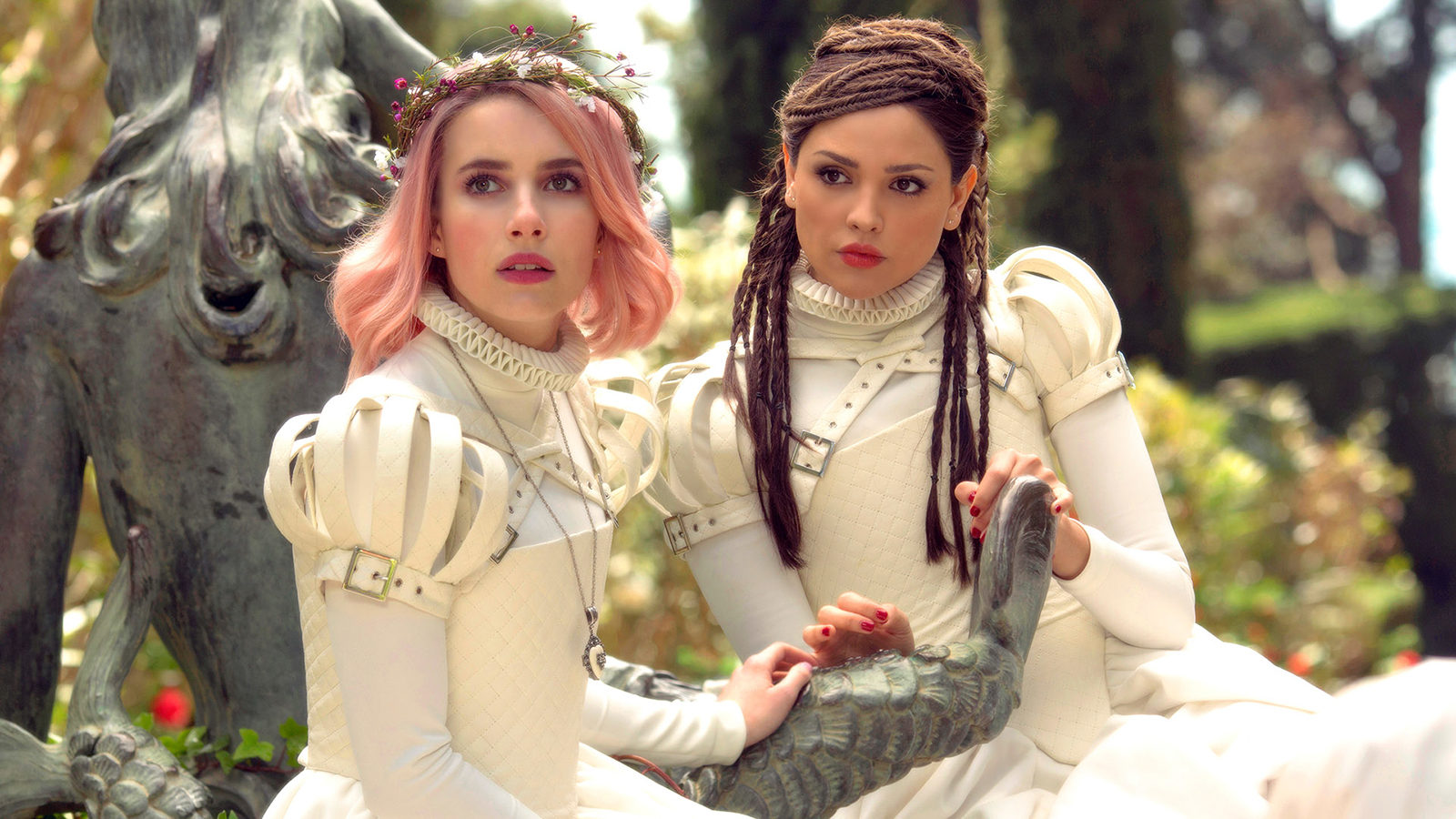Movie review: Fantasy film ‘Paradise Hills’ features firm feminist narrative

(Courtesy of Samuel Goldwyn Films)
"Paradise Hills"
Directed by Alice Waddington
Samuel Goldwyn Films
Oct. 25
By Drake Gardner
Oct. 24, 2019 10:36 p.m.
Say goodbye to the patriarchy and hello to three dystopian women who redefine what it means to be a rebel.
In director Alice Waddington’s newest production, Uma (Emma Roberts) is sent to Paradise Hills, a facility on an isolated island where the daughters of high-class families are socially perfected. The school, run by the Duchess (Milla Jovovich), features treatments such as etiquette classes, vocal lessons, makeovers, flexibility exercises and restrictive diets. But as Uma struggles to adhere to the strict rules, “Paradise Hills” transforms from a science fiction fantasy into a film that stands strong on its feminist narrative.
[RELATED: Heartfelt comedy manages to shine through in ‘Jojo Rabbit’ despite dark themes]
The convoluted narrative takes the audience through a whirlwind plot with conflicting romantic interests, mind-controlled rose bushes and hovering cars, topping it all off with sleep-inducing milk. The film – existing somewhere between a fairy tale and science fiction – inspires self-discovery as Uma and her roommates, Chloe (Danielle Macdonald) and Yu (Awkwafina), resist the concept of society’s perfect lady. However, the fantasy elements are not entirely necessary to the plot and can be distracting at times.
Waddington spins her tale nonlinearly as the film begins two months in the future with Uma’s wedding reception and then cuts to the present day. And while the moment is jarring, it provides just the right amount of suspense.
Upon arriving at the school, the film jumps headfirst into its overtly feminist message and often relies upon specific metaphors to uphold its message. The Duchess tells Uma about how a rose bush can be seen as a rose bush with thorns or a thorn bush with roses upon meeting her, which is symbolic of how the film can be viewed. “Paradise Hills” can be perceived through two different lenses: a funky movie with some crazy fairy tale costumes, or as a call to action for women to challenge the gender roles society has imposed upon them.
Uma’s interaction with the Duchess also leads to the revelation that Uma’s mother sent her to the island because their family, in dire need of money, wants Uma to marry Son, a man of immense wealth. But with Uma already in love with Markus (Jeremy Irvine), her mother was desperate for the facility to correct her love interests and behavior.
Quite unsettlingly, one of the many “treatments” Uma endures to alter her emotions involves leashing her to a carousel-type hose and “riding” through an immersive video of Son explaining why he would make a wonderful husband. The film continuously questions why it is only the women who must transform themselves for a relationship, highlighting the strict gender roles that still persist.
[RELATED: Tired tropes, dry dialogue reduce ‘Gemini Man’ to unimpressive action-film clone]
Furthermore, Roberts’ performance allowed this point of tension to shine through authentically as she showcased immense confusion and innocence. As a result, the film was not a cheap attempt at feminist commentary, since Uma and her roommates are not purposefully trying to destroy the patriarchy; they just happen to have personalities that clash with the facility’s imposed femininity. Feminist narratives often are portrayed through women overtly taking a stand, but Uma and her roommates actively take a stand by staying true to themselves.
Not only is Uma naturally strong-willed, but Chloe is also a rambunctious girl and Yu is a punk character from Beijing who listens to blaring heavy metal music on her Beats headphones. The trio are anything but the prim and proper girls at the school, and they actively try to express their feminist viewpoint.
With her role, Awkwafina hardly seems to be acting. Instead, Awkwafina’s own unabashed personality, such as speaking her own mind and being a rapper, bleeds through in her character, as do Roberts’ and Macdonald’s. Macdonald is very outspoken and her character has no shame in being loud or overweight.
Surrounded by the most proper, disciplined and perfect environment, Uma and her roommates stick out like a sore thumb – one that can’t be camouflaged by the efforts of the facility’s staff. From having meaningful conversations to violent confrontations in the last act, these girls show that no one should ever have to change themself to satisfy others. They do not simply rebel against the school because they want to be themselves but because, by being themselves, they unearth the unsettling intentions of the facility.
Uma, Chloe and Yu see past pretty rose gardens and micromanaged daily schedules to discover the facility’s most well-kept secret. The Duchess is wickedly obsessed with her attendees and needs alternate living manifestations of them. Uma’s overcoming of her tribulations throughout the film especially demonstrates that even though someone can control what someone else does, they will never be able to reach an intangible part of them that cannot be replicated or destroyed.
Waddington showcases that the individual must shape themselves in their own image, not in that of their family’s. The film’s finale accentuates this: The story suddenly reverts to an earlier scene, creating a testament to how Uma truly has taken control of her own life.
Suddenly, the film’s final moments provide a shockingly well-done ending, as Uma literally escapes the constructs of femininity in Waddington’s quirky, dark fairy tale.


